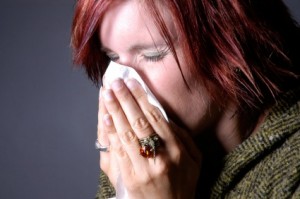 The heat and sunshine of summer may still be lingering in most parts of the northern hemisphere, but fall is on the way. Along with shorter days, cooler temperatures, and windy and rainy weather, fall brings with it the threat of the dreaded flu. Flu (short for influenza) is a disease caused by strains of the influenza viruses. It is the scourge of the colder months of the year, knocking out sufferers with an unpleasant combination of head and body aches, fever, chills, sore throats, coughing, and fatigue.
The heat and sunshine of summer may still be lingering in most parts of the northern hemisphere, but fall is on the way. Along with shorter days, cooler temperatures, and windy and rainy weather, fall brings with it the threat of the dreaded flu. Flu (short for influenza) is a disease caused by strains of the influenza viruses. It is the scourge of the colder months of the year, knocking out sufferers with an unpleasant combination of head and body aches, fever, chills, sore throats, coughing, and fatigue.
The influenza viruses are relatively common and spread very readily between human hosts. As a result, it can seem nearly impossible to avoid exposure to the virus during the flu season. However, while it is true that the flu surrounds us during certain times of the year, there are simple ways to greatly lessen your risk of exposure or to reduce your risk of infection if you have been exposed.
How The Flu Virus Spreads
Tiny droplets of moisture are created when people cough, sneeze, or talk, and researchers believe that these droplets are responsible for spreading the flu. Most of the time, the virus spreads in aerosol form, trapped inside droplets that can reach people up to six feet away following a sneeze or cough. When these droplets settle on another person’s mouth or nose, the virus has a means of accessing that person’s respiratory system and growing. If droplets have settled on a surface and that surface has not been sanitized, people may also be infected after touching that surface and then touching their mouth or nose.
Avoid Sick People
This straightforward method for avoiding the flu is not always easy to carry out. Unless you happen to be a doctor, nurse, or other health care professional, you may not know where or when you are likely to encounter individuals suffering from the flu. In reality, the responsibility for isolating sick individuals comes from those individuals themselves. Ideally, people who are sick with the flu would be scrupulous about staying home and away from the public until they are well and no longer contagious.
Unfortunately, that doesn’t always happen. And while this is largely out of your control, there are a few things that healthy people can do to encourage sick people to isolate themselves. Managers or others in positions of authority at a place of business can not only make it possible for sick employees to take time off, but insist that they stay home until there is no possibility of them spreading the infection to other people. This is particularly important for individuals in customer service, food service, or other jobs that require them to regularly interact with the public.
Teachers and school administrators can also protect their students by insisting that sick children stay at home until they are well again. Parents who work full time may find it difficult to keep their sick child home, but firm policies on the part of the school as a whole can help to prevent a single sick child from becoming an epidemic that infects many students. (Consider encouraging your child’s principal to enact such policies if they don’t already exist.)
175 Homemade Herbal Formulas for Keeping Yourself Feeling Amazing
Wash Or Disinfect Your Hands
The simple act of hand washing can eliminate much of the spread of flu on the part of sick individuals and the chance for infection for healthy individuals. As we looked at earlier, flu tends to be spread directly as an aerosol or indirectly when individuals touch infected surfaces.
To avoid leaving traces of the virus on surfaces around you when you are sick with the flu, wash or disinfect your hands every time you blow your nose or touch your nose or mouth. Since you may not always have access to soap and water when you are out and about, the best solution can be to carry a small bottle of hand sanitizer with you wherever you go.
When you are healthy, keeping your hands clean and sanitized can be a key element of making sure you stay that way. Although aerosol exposure is believed to be the more common means of infection, surface infection is more insidious because there is no way of knowing what surfaces may have traces of the flu left by a sick person. As a result, healthy people should try to be as vigilant as sick people about washing their hands or using hand sanitizer before and after touching surfaces that are likely to be touched by many other people. Think trays at a cafeteria, doorknobs and handles, drinking fountains, and the like.
NOTE: What’s one surface that is regularly touched by dirty hands? The handles on sink faucets. When you wash your hands and then turn the faucet off, you are re-exposing yourself to any germs that were living on the handles. To preserve the benefits of the hand washing, dry your hands with a paper towel and then use the towel to turn off the faucet.
Avoid Touching Your Mouth And Nose
Hand washing is great, but hands are only agents of infection when they touch your mouth or nose – the orifices through which a respiratory infection introduces itself to the world. Keeping your hands away from your mouth or nose is key to preventing the spread of the flu and other infections.
This is difficult advice to follow when you are ill and are sneezing and coughing regularly. That is when hand sanitizer and staying home are key. But when you are healthy, keeping your hands away from your mouth and nose will greatly reduce the chances that you will catch any infections that your hands happen to come across. This is particularly important in the interim between times when you have touched a surface that may be infected and your first opportunity to wash or sanitize your hands.
A handkerchief can be useful if you find it difficult to keep your hands away from your mouth and nose. Handkerchiefs have gone out of style with most people, but they are great tools for keeping a barrier between your mouth and nose and the rest of the world. Having a handkerchief can also eliminate the discomfort of needing to blow your nose but not having access to a tissue or napkin.
Exercise!
How is exercise good for you? Let me count the ways… Among all of its many benefits, regular exercise can help to keep your immune system working well. A strong immune system will help your body to resist flu viruses if you are exposed or fight off the infection more quickly if you happen to get sick. In general, people should try to get one hour and fifteen minutes of vigorous aerobic exercise per week, or two and a half hours of moderate aerobic activity per week.
Zinc, Echinacea, and Vitamin C
While the official research on the cold and flu prevention benefits of these substances is a bit inconclusive, many people swear by them as a means of warding off sickness. Zinc is available in lozenge or spray form, and devotees often opt to take some at the first hint of a sore or scratchy throat or other symptoms of a developing respiratory infection. Vitamin C is available in tablets or powders, as well as in citrus fruits and certain other foods. Echinacea comes in pills, though some people prefer to drink echinacea tea in order to get a dose.
©2012 Off the Grid News










